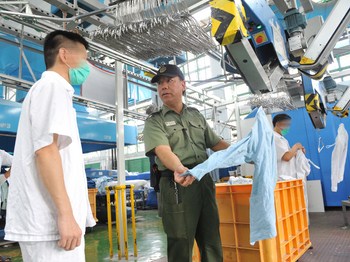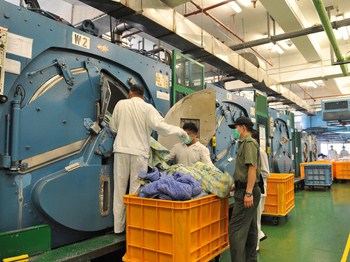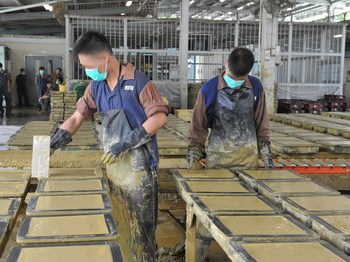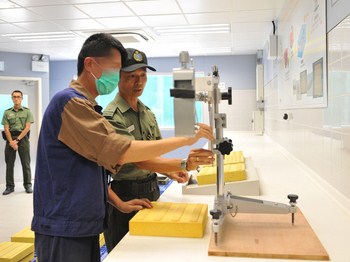Press Release

Prison workshops aid in fresh starts
For an inmate at Pik Uk Prison, learning how to launder others’ linens and uniforms has helped him clean up ‘dirty laundry’ of his own. (Video)
Kit, not his real name, was jailed for drug trafficking. He was assigned to the prison workshop which does laundry for the five public hospitals in the New Territories East.
Here, he has acquired new trade skills, developed a good work habit, shouldered his responsibilities, and appreciated the spirit of teamwork - all of which enhance his employability and facilitate his rehabilitation.
"I know that I did something wrong and upset my family. I am trying to do some good things to compensate the community,” Kit said.
As a father of two daughters, he felt ashamed to be in jail. His family has been supportive, though, which he did not expect. He was moved when his daughters sent him a Father's Day card.
Kit was less than enthusiastic when he first reported for duty in the four-storey industrial laundry. He had no firsthand experience in washing clothes and did not know how to use an iron. Technical instructor Cheng Yu-sum, who has been working in the Correctional Services Department for 18 years, patiently taught Kit the basics of ironing and folding clothes.
Mr Cheng also encouraged him to follow directions and work hard. With a strong team spirit permeating the workshop, Kit’s attitude began to change.
Many inmates are rebellious, unco-operative and even hostile when they first arrive, Mr Cheng said.
"As I become older, I treat them as my juniors," he said, adding society has changed and today’s inmates generally have a higher education level. Instructors can't just give them orders, but must explain patiently why they should do as they are told.
Another experienced instructor is optimistic about inmates’ chances upon their release.
"In my years in Correctional Services, I have seen a lot of inmates work hard in the workshops. If they can maintain this positive attitude towards work upon their release from prison, many employers would be keen to hire them, and help them re-integrate into society," Chief Officer Wong Wai-kuen said.
Skills acquisition
The Pik Uk Prison laundry is no different from a real industrial laundry, with a ground-floor loading area, giant-sized washing machines and other equipment on different floors, all linked by conveyor belts.
Kit works alongside 300 other inmates. Each has different posts, responsible for sorting, operating the machines, ironing and folding the clothes and linens. The workshop can handle more than 23,000kg of clothes and linens every day and provides one-stop service for the hospitals it serves.
While undergoing job training in the workshop, Kit has also taken up a Putonghua course, retailing services courses, and word processing. He is confident he will find a job upon his release in May next year.
Market-driven courses
The Correctional Services Department has been providing more market-driven vocational training for inmates in recent years, allowing them to obtain recognised qualifications towards the Intermediate Trade Test Certificate held by the Construction Industry Council and Vocational Training Council.
The precast concrete workshop at the Tai Lam Correctional Institution is an example. It produces items commonly seen on city streets, including street name signs, road signs, roadside kerbs and tactile tiles that provide directional guidance for the blind.
At this workshop, inmates also learn how to mix concrete, the molding process and how to operate overhead cranes that are commonly used in the construction industry.
In a laboratory inside the workshop, inmates carry out quality control tests under officers’ supervision to ensure the kerbs and tactile tiles meet stringent standards. Three prison laundries and one sign-making workshop have obtained certification to the internationally recognised ISO 9001 Quality Management System.
Currently, Hong Kong’s 29 correctional institutions offer more than 130 workshops which provide vocational training. Last year, Correctional Services Department industry units generated products and services worth more than $400 million, including government office furniture, staff uniforms, leather items, hospital linens, filter masks and litter containers. They also laminate books for public libraries, undertake printing work, and make envelopes for government departments.
Inmates are paid a nominal wage for their work, although they do not actually handle the cash while behind bars. They must save 10% of their wages - until they have accumulated $500 - and may spend the remaining amount to buy snacks, necessities or cigarettes. Inmates can collect the cash balance upon their release from prison - enough at least for the bus fare back to the real world and a clean shirt on their back.

Vocational training: Correctional Services Department technical instructor Cheng Yu-sum encouraged Kit (a pseudonym) to follow directions and work hard in the laundry workshop.

Division of labour: About 300 inmates man the laundry at the Pik Uk Prison, handling up to 23,000kg of clothes and linens each day.

Mass production: More than 90% of tactile tiles used on Hong Kong streets are created at the Tai Lam Correctional Institution’s precast concrete workshop.

Quality control: Officers supervise an inmate who tests tactile tiles to ensure they meet stringent standards.



























 Back
Back